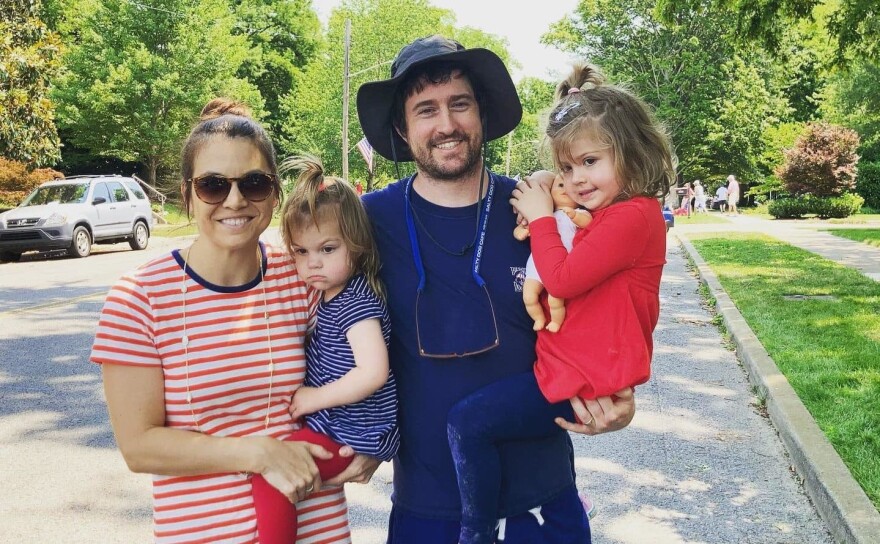Pfizer-BioNTech has announced that its coronavirus vaccine for kids ages 5 to 11 is safe and effective, and there’s speculation that the shot could go into kids’ arms by Halloween.
The news comes as the Delta variant closes 1,400 schools in 35 states since the new school year began. And the number of kids and adolescents testing positive tops 250,000, the highest in the entire pandemic.
Yet even for parents excited about it, the shots can spark worry about side effects such as soreness at the injection site, fever, fatigue and aches.
Some parents have already made the decision to vaccinate their kids by enrolling them in clinical trials. Among the thousands of families whose kids joined the clinical trials are Maggie and Pierce Sandwith.
The couple’s 2-year-old daughter Caroline got the Moderna vaccine in June, both to protect her and her sister Louise who is being treated for leukemia, leaving the 4-year-old susceptible to COVID-19.
Pierce Sandwith says his daughter reacted how one might expect a 2-year-old to handle getting a shot.
“It was all fun and new and interesting until the shot actually occurred,” he says. “And then there were some tears and anger, but really not any different than any other shot she’s received.”
Caroline is up to date on her vaccines so the experience wasn’t novel to her, Maggie Sandwith says. This time, however, the couple needed to keep their daughter entertained for a couple of hours in the hospital during an observation period after the shot.
The toddler took part in a dosing study, which means her parents know for sure that she didn’t receive a placebo. The confirmation that Caroline received the vaccine gives the couple peace of mind as her sister finishes treatment for leukemia, the couple says.
Caroline didn’t have any reaction to the shot beyond some soreness near the injection site, Maggie Sandwith says.
“No news is good news,” she says. “And we believe that she does have the antibodies.”
The Sandwiths need to keep Louise in a protective social bubble until she finishes the active part of her treatment next month. Louise can’t get the vaccine because of both her treatment and her age.
“Maggie and I could get the vaccine and so could other members of our family that are over 12,” Pierce Sandwith says. “Caroline having that is such a godsend for our family because it just gives us another layer of protection for Louise as she hopefully finishes up treatment as an immunocompromised person.”
The family has struggled with keeping Louise in a bubble during the pandemic, Maggie Sandwith says. The doctors initially said Louise could return to daycare and social activities after the hardest part of her treatment – but they reversed the statement when the pandemic began and instructed her parents to keep her isolated.
The Sandwiths have all made sacrifices to protect their vulnerable daughter: Both parents work from home full time and Caroline was pulled out of daycare, which is impacting the child’s social development. The couple hopes Caroline’s inoculation will allow them to start interacting with other families again while keeping Louise protected.
Pierce Sandwith knows some people think he’s letting doctors use his 2-year-old as a guinea pig and putting her at risk to protect her sister but notes that the family didn’t take the decision lightly.
“What we thought about was Louise’s treatment was made, planned, discovered, made safe, as safe as it can be for her, because people were willing to volunteer their children for trials, just like the COVID-19 vaccine trial,” he says. “Without the sacrifice of those folks, Louise’s leukemia used to be a terminal illness.”
Before new treatments were developed, children had very little chance of surviving leukemia, he says. Now, thanks to trials and research, the blood cancer has a 90% survival rate.
The Sandwiths only got a spot in the Moderna trial because another family dropped out. And some parents drove four or five hours to get their children to the location of the trials.
But when it comes to older kids who can now get the shot, only 40% of the country’s 12 to 15-year-olds are vaccinated.
The data from the dosing trial Caroline participated in can now help other parents make the best decision for their children, her father says.
“It’s just a great way to make sure that your child is as healthy as they can be,” he says. “And this vaccine is a real gift to get out of the pandemic as we know it right now.”
Vaccine mandates in schools would give the Sandwiths additional peace of mind, Maggie Sandwith says. Some of the Sandwiths’ family members work as teachers in schools without vaccine mandates, which concerns them as the Delta variant continues to spread.
While her family’s circumstances are unusual because of Louise’s treatment, Maggie Sandwith believes parents need to vaccinate their kids to ensure they will have opportunities to learn and grow.
“This is a situation where we all need to be thinking of others and of how we can best protect even the most vulnerable in our society,” she says. “And the best way that we can do that is to get vaccinated.”
Karyn Miller-Medzon produced and edited this interview for broadcast with Todd Mundt. Allison Hagan adapted it for the web.
This article was originally published on WBUR.org.
Copyright 2021 NPR. To see more, visit https://www.npr.org.


